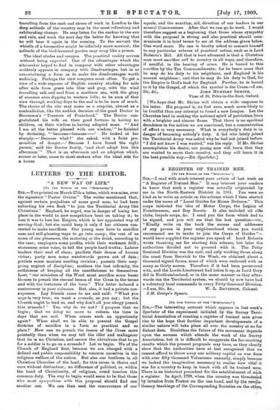LETTERS TO THE EDITOR.
"A NEW WAY OF LIFE."
[To !U NOrr021 Or nil "SrsOrATOO:1 Sra,—You printed on March 27th a letter, which was mine, over the signature "Pastor Ovium." The writer mentioned that, against certain prejudices of some good men, he had been exhorting his own flock "to join the Territorial Army like Christians." England, he urged, was in danger of losing her place in the world to new competitors bent on taking it; to lose it was to lose her Empire, which is her appointed way of serving God; but she could keep it only if her citizens con- sented to make sacrifices. Our young men have to sacrifice ease and self-pleasing ways to go into camp ; the rest of us some of our pleasures, the motoring or the drink, according to the case; employers some profits, while their workmen drill; statesmen some votes, to tell the people hard truths; Labour leaders their zeal of class; pacifists their dream of human virtne;, party men some watchwords grown out of date ; pietists some maxims needing revision ; parents their easy- going neglect of discipline; mothers the last infirmity, the selfishness of keeping all the unselfishness to themselves. Last, "our ministers of the Word must sacrifice some lesser themes to preach the eternal lesson of the Cross in the terms and with the instances of, the hour." This letter induced a controversy in your columns. But, also, it had a private con- iriquence. Lay friends came to me and said; "What you urge ia very true; we want a crusade, as you say ; but the Church ought to lead us, and why don't all you clergy preach this crusade?" Yes, why do we not ? I propose that we begin ; that we delay no more to redeem the time in days that are evil. When comes such an opportunity again? When shall we be able to present the Gospel doctrine of sacrifice in a form so 'practical and so plain ? How can we preach the lesson of the Cross more pointedly than when we may tell the idler and malingerer that he is no Christian, and assure the chivalrous that to go for a soldier is to go on a crusade ? Let us begin. We of the Church of. England first, because we are charged with a defined and public responsibility to concern ourselves in the religious welfare of the nation. But also our brethren in all Christian Churches of the land; for this cause is theirs and ours without distinction ; no.difference of political, or, within the bond of Christianity, of religious, creed. touches this common duty.. The way to begin 'would seem to be that those who most sympathise with this proposal should find one another out. We can then seek the 'concurrence of our
equals, and the sanction, aid, direction of our leaders in our several Communions. After that we can go to work. I would therefore suggest as a beginning that those whose sympathy with the proposal is strong and also practical should ,com- municate it in brief terms to me at the address given below. One word more. No one is hereby asked to commit himself to any particular scheme of practical action, such as is.Lord Roberts's Bill. All that is here advanced is that a Christian man must sacrifice self to country in all ways, and therefore, if needful, in the bearing of arms. He is bound to this sacrifice by the Ten Commandments; for lie bears arms that he may do his duty to his neighbour, and England is his nearest neighbour ; and that he may do his duty to God, for the Empire is God's task for England. Further, he is bound to it by the Gospel, of which the symbol is the Cross.I am, Sir, &c., JOHN HUNTLEY SEETHE..
Vicar of St. Peter-in-the-East, Oxford.
[We hope that Mr. Skrine will obtain a wide response to his letter. His proposal is, we feel sure, much more likely to be fruitful than any attempt to found a new League. Let the Churches lead in making the national spirit of patriotism burn with a brighter and clearer flame. That there is no spiritual decadence in the nation we are convinced, but a concentration of effort is very necessary. What is everybody's duty is in danger of becoming nobody's duty. A lad who lately joined the Territorial Army was asked why he bad not joined before. "I did not know I was wanted," was his reply. If Mr. Skrine accomplishes his desire, our young men will learn that they are wanted to serve their country, and they will learn it in
the beat possible way.—ED. Spectator.] z








































 Previous page
Previous page